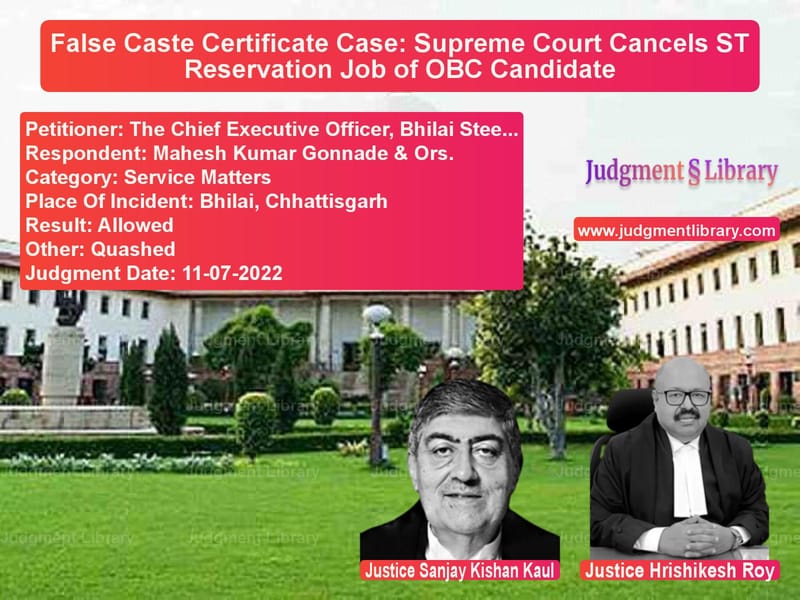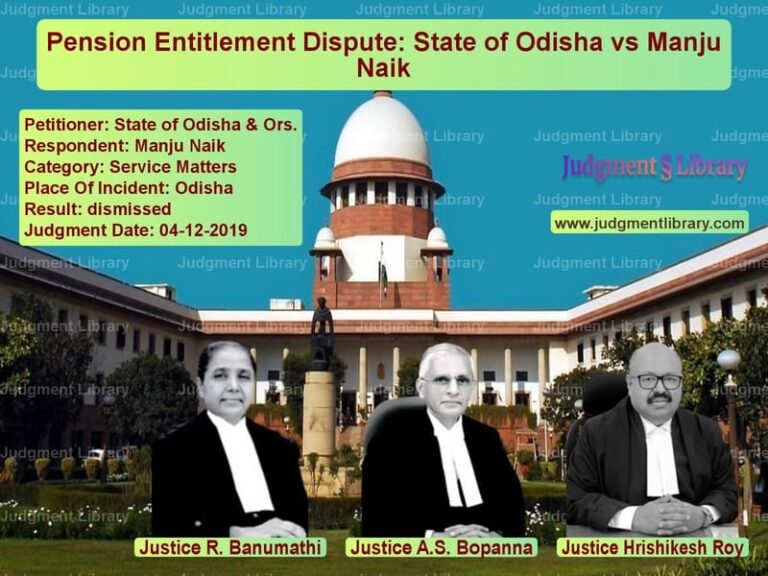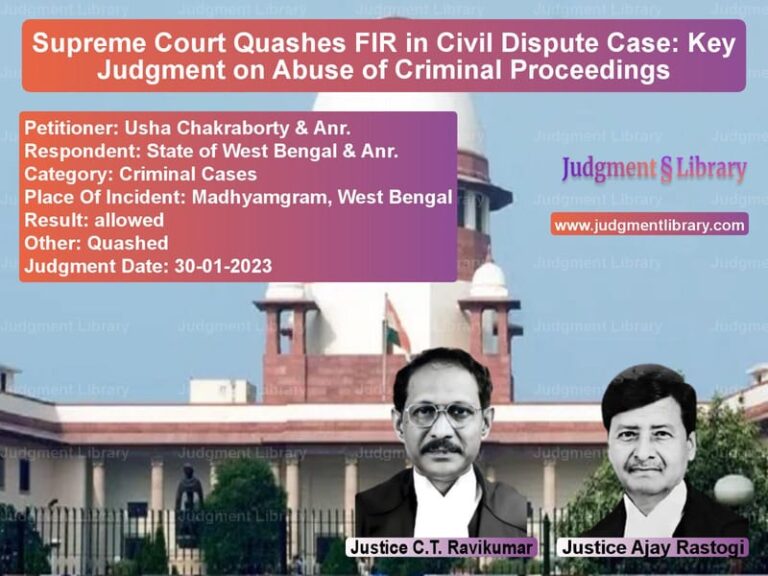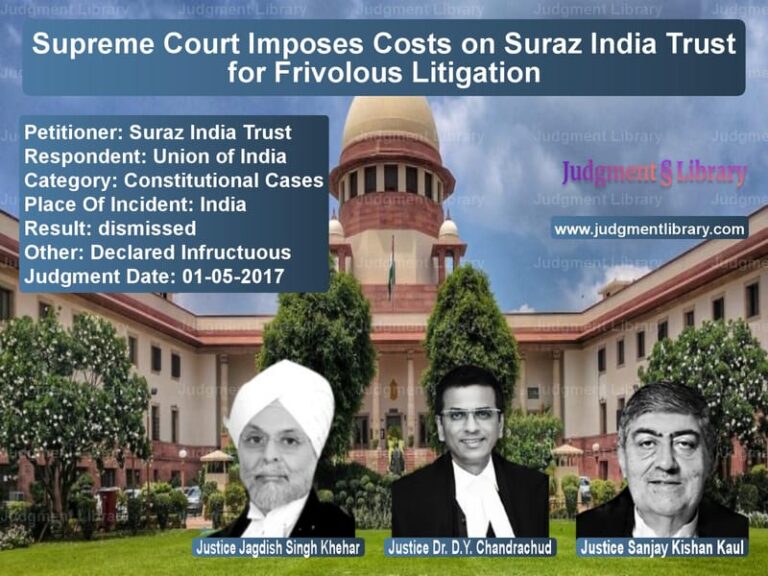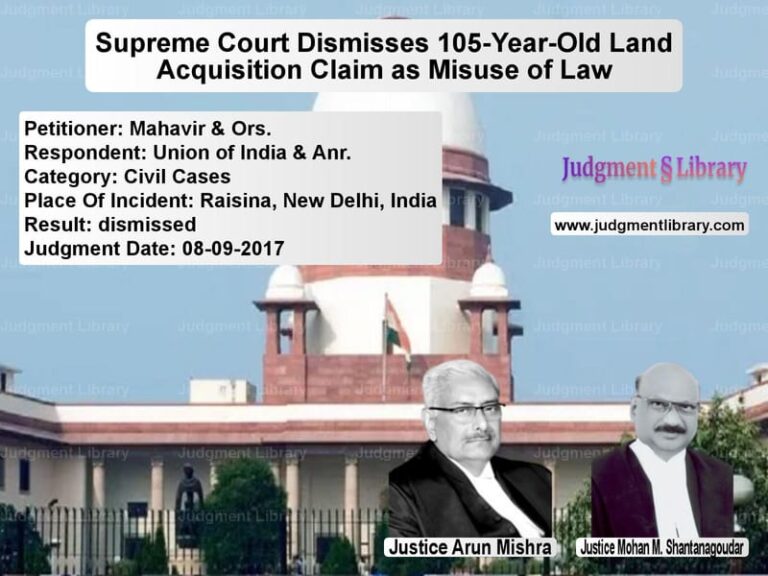False Caste Certificate Case: Supreme Court Cancels ST Reservation Job of OBC Candidate
The case of The Chief Executive Officer, Bhilai Steel Plant vs. Mahesh Kumar Gonnade & Ors. deals with the critical issue of wrongful reservation benefits obtained through a false caste certificate. The Supreme Court ruled that the respondent, who belonged to the Other Backward Classes (OBC), could not continue in a government post meant for a Scheduled Tribe (ST) candidate. The Court set aside the relief granted by the High Court and upheld the termination of the respondent’s employment.
Background of the Case
Mahesh Kumar Gonnade, the respondent, obtained a caste certificate in 1987 identifying him as a ‘Halba’ Scheduled Tribe (ST). On this basis, he secured a job in 1995 as a Management Trainee (Technical) at the Bhilai Steel Plant, which falls under the Steel Authority of India Limited (SAIL). In 2008, doubts were raised regarding his caste status, leading to a verification by the High-Level Caste Scrutiny Committee in Raipur.
The committee’s investigation revealed that the respondent actually belonged to the ‘Halba/Koshti’ community, which is categorized as an OBC in Chhattisgarh. As a result, his ST caste certificate was canceled on July 15, 2015, and the Vigilance Department recommended necessary action. Based on this, the Bhilai Steel Plant terminated his employment on October 24, 2015, and ordered the forfeiture of his service benefits, including gratuity and pension.
The respondent challenged the termination before the Central Administrative Tribunal (CAT), which dismissed his plea on procedural grounds. He then moved the High Court of Chhattisgarh, which ruled in his favor and set aside his termination. The employer, Bhilai Steel Plant, challenged this order in the Supreme Court.
Arguments Presented
Petitioner’s (Bhilai Steel Plant) Arguments:
- The respondent falsely claimed an ST status and deprived a legitimate ST candidate of the job.
- The High Court wrongly applied the precedent set in State of Maharashtra vs. Milind, which was later clarified in Union of India vs. Dattatray.
- The Supreme Court has consistently ruled that individuals who secure employment through false caste certificates cannot be retained in their positions.
- The government had already issued a circular in 2016 clarifying that employees who obtained jobs under false caste certificates must be removed.
Respondent’s (Mahesh Kumar Gonnade) Arguments:
- The respondent argued that he was issued an ST certificate by a competent authority and had served for over 20 years.
- His appointment preceded the Supreme Court’s 2000 ruling in Milind, which clarified that ‘Halba Koshti’ does not qualify as an ST category.
- Since he was appointed in 1995, the government’s 2010 and 2016 clarifications should not apply retroactively to him.
- His termination without a proper show-cause notice violated principles of natural justice.
Supreme Court’s Observations and Ruling
The Supreme Court analyzed whether the High Court correctly applied the Milind judgment to protect the respondent’s employment. The Court observed:
- The High Court erroneously applied the Milind judgment without considering later rulings that clarified it.
- The Supreme Court had already ruled in Dattatray that jobs obtained through false caste certificates should not be retained.
- The respondent had been given ample opportunity to defend his caste status before the High-Level Caste Scrutiny Committee but failed to provide evidence proving his ST status.
- The government’s 2016 circular mandated the removal of individuals who obtained jobs under false caste certificates.
The Supreme Court concluded:
“The respondent no.1 being an OBC cannot be retained in a ST category post. However, the emoluments paid to him should not be recovered. It is further held that the respondent no.1 is disentitled to any pensionary benefit by virtue of his wrongful appointment.”
The Court ruled that the respondent could not claim any legal or equitable right to continue in the position and reversed the High Court’s order. However, it held that the salary he had earned during his service period should not be recovered.
Key Takeaways from the Judgment
- This ruling reaffirms that jobs obtained through false caste certificates cannot be retained.
- The Court clarified that its earlier ruling in Milind did not provide blanket protection for individuals who misrepresented their caste.
- While the respondent was not required to return his past salary, he was denied pension and other retirement benefits.
- The judgment underscores the importance of fair and transparent recruitment processes, ensuring that reservation benefits go to legitimate candidates.
Conclusion
The Supreme Court’s verdict in this case serves as a strong precedent against misuse of caste-based reservations in government jobs. The ruling ensures that individuals who secure employment through false caste certificates cannot continue to occupy posts meant for genuine beneficiaries. It upholds the principles of merit-based reservation and prevents wrongful deprivation of opportunities for legitimate ST candidates.
Petitioner Name: The Chief Executive Officer, Bhilai Steel Plant.Respondent Name: Mahesh Kumar Gonnade & Ors..Judgment By: Justice Sanjay Kishan Kaul, Justice Hrishikesh Roy.Place Of Incident: Bhilai, Chhattisgarh.Judgment Date: 11-07-2022.
Don’t miss out on the full details! Download the complete judgment in PDF format below and gain valuable insights instantly!
Download Judgment: the-chief-executive-vs-mahesh-kumar-gonnade-supreme-court-of-india-judgment-dated-11-07-2022.pdf
Directly Download Judgment: Directly download this Judgment
See all petitions in Termination Cases
See all petitions in Recruitment Policies
See all petitions in Public Sector Employees
See all petitions in Judgment by Sanjay Kishan Kaul
See all petitions in Judgment by Hrishikesh Roy
See all petitions in allowed
See all petitions in Quashed
See all petitions in supreme court of India judgments July 2022
See all petitions in 2022 judgments
See all posts in Service Matters Category
See all allowed petitions in Service Matters Category
See all Dismissed petitions in Service Matters Category
See all partially allowed petitions in Service Matters Category

